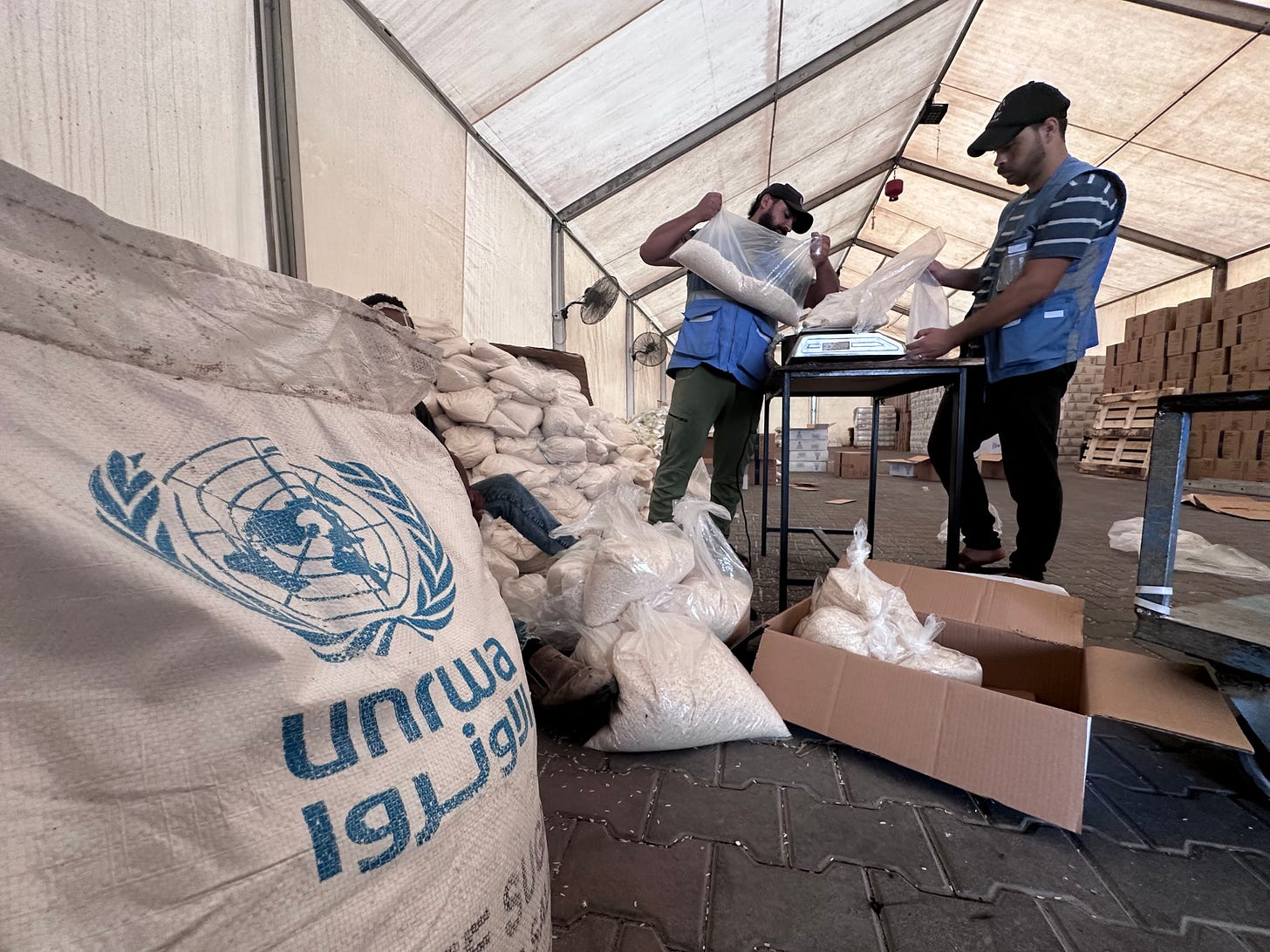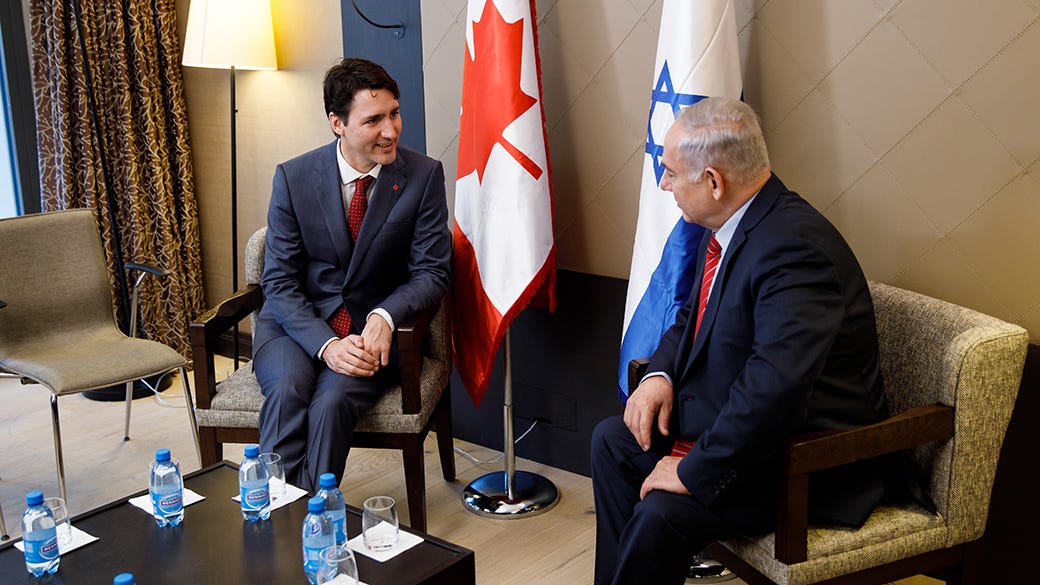Canada's UNRWA funding has been restored, military exports to Israel have suspended. What comes next?
Where does Canada need to focus their efforts to implement the ICJ's provisional ruling?

After the preliminary ruling issued on January 26th by the International Court of Justice in the case of South Africa v. Israel, numerous countries withdrew funding from UNRWA due to allegations from Israel that UNRWA staff participated in the October 7th attacks.
The incredibly short turnaround between the ICJ ruling and the UNRWA allegations proved suspicious, and revelations from EU Commissioner Janez Lenarčič that neither he nor any other Commissioner under President Ursula von der Leyen have received evidence from Israel regarding these allegations, seem to confirm suspicions that these allegations and the resulting withdrawal of UNRWA funds were in bad faith.
With increasing pressure from pro-Palestinian protestors, millions of Gazans suffering under man-made famine, and millions more Palestinians relying on UNRWA aid across the Levant, eventually Minister of International Development Ahmed Hussen would reverse his suspension of UNRWA funding in time for their next schedule payment.
And now, as it becomes public that Canada has paused approval of military exports to Israel due to concerns of their use in human rights violations, it is clear that the political winds have changed, in the favour of pro-Palestinian advocates. Not only has UNRWA funding been resumed, but Canada is no longer helping equip and arm Israel’s military.
Does this mean that Prime Minister Trudeau or his government will stop facing increasingly large pro-Palestinian protests, including one protest planned this very evening at Trudeau’s fundraiser in downtown Toronto? Of course not.
There’s still a lot more that Canada needs to do, not only to meet our legal obligations to carry out the ICJ ruling, but also our moral obligations to the Palestinian people. So, for pro-Palestinian advocates making concrete policy asks from Prime Minister Trudeau and his cabinet, here’s the question of the hour: What comes next?

The immediate issue that comes to hand is the NDP motion set to be voted upon in the House of Commons on March 18th. The motion calls for Canada to demand a ceasefire (which it does), for Canada to suspend military exports to Israel (which it has), and for Canada to restore funding to UNRWA (which it has).
But the main thrust of the motion is in what it covers that Canada hasn’t done. The NDP motion requests that Canada lift the arbitrary 1,000-person cap on visas for the family members of Palestinian Canadians fleeing the Israeli assault on Gaza. No such arbitrary restrictions were placed on refugees taken from Ukraine after the Russian invasion.
Meanwhile, while Minister of Immigration, Refugees and Citizenship Marc Miller made great political hay of this program to help Palestinian Canadians rescue their family from Gaza, it was reported in the CBC that not a single Palestinian in Gaza has actually been admitted under this program.
The argument that Canada does not have the leverage to force Israel to let the refugees exit through Rafah is groundless; Australia, no more powerful or influential than Canada, has already granted visas to hundreds of Palestinian refugees, whom have safely evacuated the Gaza Strip.
While attending pro-Palestine protests, I have heard speakers talk about how they contact Minister Miller’s office every single day, how they repeatedly receive no response, how they are terrified that their families will die because Canada is not acting to save them. They deserve answers from the Trudeau government about why their families have been abandoned.
The next demand of the NDP motion, and another material ask that the Canadian government can fulfill unilaterally, is to ban settler extremists from entering Canada, and to impose sanctions on Israeli government officials whom incite genocide. It should not be a radical proposition to say that if you use violence to annex territory against international law, that you will not be allowed to enter Canada.
As for sanctions, there are two clear targets in Netanyahu’s cabinet: Israeli Minister of Finance Bezalel Smotrich, whom called for the forced migration of millions of Palestinians, and Israeli Minister of National Security Itamar Ben-Gvir, whom has been criminally convicted by Israel’s own courts for his support of the banned Kach terrorist organization.
It is my humble opinion that Ben-Gvir, arguably a literal terrorist, should be sanctioned by the Canadian government, on the grounds that he was criminally convicted for supporting terrorism. This perspective of mine is not limited to Itamar Ben-Gvir, but indeed I would apply these consequences to everyone involved with all variations of ethnic nationalist terror. I believe this is a fair standard to hold!
Of course, the most prominent demand of the NDP motion, the coup-de-grace for the pro-Palestinian protest movement, would be for Canada to fully recognize the independent State of Palestine. Ultimately, beyond the immediacy of the current Israel-Hamas War, diplomatic recognition of Palestine is the endgame.
So, if the Liberal Party claims to support a two-state solution, not merely the promise of one but the reality of one…why aren’t they backing up words with action?

The immediate argument posed by Netanyahu is that diplomatic recognition of the State of Palestine would be a “reward for terrorism,” a claim so fundamentally wrong on every possible level that only Benjamin Netanyahu could have been the one to say it.
The Fatah-led Palestinian Authority in the West Bank bears no organizational ties to Hamas, and indeed Israel cooperates with the Palestinian Authority on a daily basis in their military occupation of the West Bank.
Israel in fact collects tax revenue on behalf of the Palestinian Authority, but since October 7th has refused to provide the Palestinian government with access to those funds, a collective punishment.
Canada already recognizes the Palestinian Authority as the legitimate representative of the Palestinian people, as evidenced by the photo at the top of this column where Minister Mélanie Joly met and shook hands with President Mahmoud Abbas.
It is clear that both Israel and Canada recognize the Palestinian Authority. It is clear that on the same basis where Israelis have the right to self-determination and thus statehood, that Palestinians have an equal right to self-determination and thus their own statehood. If that right is inalienable for Israel, then surely it is also inalienable for Palestine.
Netanyahu’s argument, and the argument of his surrogate organizations in Canada such as the lobbying group CIJA, is that Palestinian self-determination is a conditional right, while Israeli self-determination is beyond reproach. This is blatant, naked racism of the highest order, and I fully reject this absurd double standard held solely for Palestinians.
Palestinian statehood is not a gift for Israel to bestow at the whims of their own grace and mercy. Palestinian statehood is the inherent right of the Palestinian people, to live freely and peacefully in their own homeland, and to have control and agency over their own lives.
To be frank, if Netanyahu sincerely believes that the actions of violent extremists invalidate the right to self-determination, then perhaps he should not have attended a celebration of the 60th Anniversary of the King David Hotel bombing.
Indeed, former Prime Minister of Israel Menachem Begin, for his activities leading the Irgun terrorist group, was banned from entering the United Kingdom until 1972. Perhaps a lesson for Canada on the proper way to treat Kahanists such as Smotrich and Ben-Gvir, rather than the velvet gloves which we use right now.
For the next stretch of pro-Palestinian advocacy in Canada, the steps that lay ahead are clear. Minister Marc Miller must act materially to bring the family members of Palestinian Canadians out of Gaza, and not merely issue press releases claiming he will.
Sanctions must be placed on both Israeli settlers violating international law, and the Kahanist politicians in Netanyahu’s cabinet helping promote anti-Palestinian terror and helping block humanitarian aid from entering Rafah.
Most importantly, Canada must finally recognize the existence of the State of Palestine, which is already recognized by 139 out of the 193 UN member states, and additionally recognized by the United Nations as a whole.
Israel, and Netanyahu particularly, have had decades to act in good faith since the Oslo Accords, and they have not done so. It is time for Canada to act in good faith, to pursue the two-state solution in truly good faith; it is time for Canada to recognize the existence of the State of Palestine.



